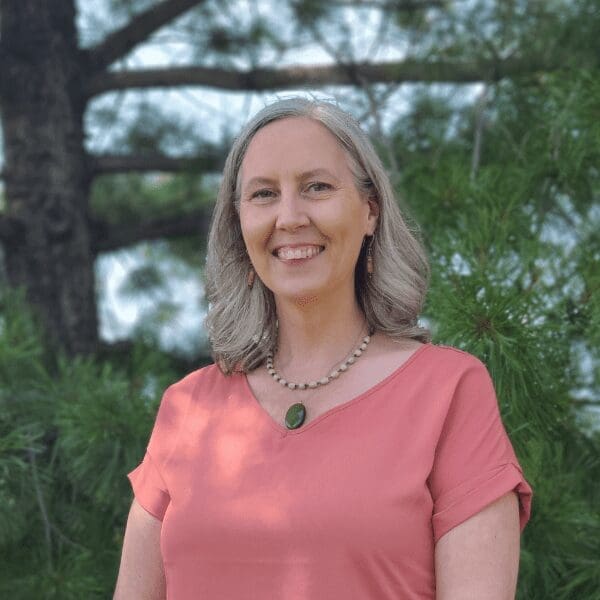
Investing in Educators: A Conversation on Unity’s New Benefit
Unity Environmental University recently announced that starting on January 1, 2025, the university will be offering an 8% retirement benefit match to its part-time employees including adjunct faculty members. This is a momentous step in the University’s commitment to equity across all employment types. In a candid discussion with key Unity Environmental University Distance Education leaders – Dr. Jennifer Cartier (JC), Dr. Kelly Boyer Ontl (KBO), and Dr. Michaeleen Gerken Golay (MGG) explore how this initiative aligns with Unity’s core values, strengthens its position as a leader in the field, and enhances both adjunct faculty satisfaction and student success.



In what ways do you think this initiative enhances Unity’s position as a leader in supporting adjunct faculty compared to other institutions?
MGG: This move is on-brand for us. Our core values include respect, integrity, and social responsibility, so it just makes sense to ensure our adjunct instructors have the same access to planning for their future financial stability as the rest of our faculty and staff. It is no secret that adjuncts at other institutions are overworked, underpaid, and struggle with many associated insecurities. But Unity never takes the same approach as those other institutions.
JC: In my experience, Unity is unique in acknowledging the important and vital role that adjuncts play in our students’ success. We don’t include adjuncts because we have to – which is what I think a lot of institutions do – they staff courses with adjuncts when they are unable to fill those positions with full-time faculty. At Unity we include adjuncts because we want to. They’re not the “next-best” choice. They’re the choice. In DE at least, we built our model around adjuncts because we understand that they bring diverse and rich experiences that would be impossible to provide to our students if we were constrained by a more traditional faculty model. We routinely hear from our adjunct faculty that they love teaching with us, that our courses are very well designed, and that, for this reason, they have more time to devote to engaging with and providing feedback to our students. Our compensation model is also more generous than many other institutions – our adjuncts are paid based on the number of students they teach. So we don’t take advantage of adjuncts by overloading their courses, for example, and just paying them a set rate. As far as how this particular initiative fits with our existing practices, I think it makes perfect sense. Our adjunct faculty are highly valued professionals. It is a privilege to be able to offer them compensation that reflects this.
KBO: Many institutions will likely soon be offering retirement benefits due to the upcoming government ruling, but Unity stands apart by offering the same retirement match to all employees—regardless of how much they work or their type of employment. Whether you’re a full-time administrator or a part-time adjunct, you receive the same benefit. This shows that we value every person contributing to our mission, not just those in full-time positions, and strengthens our position as a leader in faculty support. We aren’t just trying to comply with a new government regulation, we are surpassing it and supporting all Unity employees.
What specific challenges do adjunct faculty face regarding financial planning and job security, and how does this new retirement benefit aim to address those issues at Unity Environmental University?
MGG: A report from the American Federation of Teachers last year highlights some of those issues. In our model, course assignments for adjuncts are enrollment driven so there will always be an element of unpredictability. But unlike other schools, we don’t pile on the stress by also asking adjuncts to do all of the same things as a full time employee but just at a lower rate. At Unity, we separate the many tasks of faculty: our Learning Experience Designers and Subject Matter Experts prepare the course materials, lectures, and assignments, and our Academic Advisors help students plan their courses and degree paths. Adjuncts are able to focus their efforts on engaging students in their courses, and are compensated better than at many other institutions. I often hear from adjuncts that they prefer working at Unity. When they are invested in us, that really means they are invested in our students. We want to keep those quality instructors with us, and I think this retirement benefit is another way to do so.
JC: I recognize that some of our adjuncts do face challenges with financial planning and security because they are balancing multiple teaching jobs at different institutions and not able to access benefits at any of them. Other adjunct faculty have full-time positions and benefits and are less vulnerable in terms of financial security. Even for those faculty, it is important to be able to contribute to their long-term wellbeing by supporting retirement savings. And, like Dr. Gerken Golay said, our commitment to these faculty increases the likelihood that they will be invested in our students and provide the best possible learning experience.
KBO: Many adjuncts face financial challenges because they often have to piece together work from multiple institutions as part time employees who had not been eligible for benefits. For some people who need a flexible schedule or accommodations in their lives (like many of our students), online asynchronous adjuncting can be a great solution. The new retirement benefit allows us to provide more financial security to adjuncts, ensuring they have a solid foundation for their future in addition to the flexibility that comes with their role. As Dr. Cartier noted, I also want to acknowledge that not all adjuncts struggle with financial insecurity, as many are working other full-time jobs that provide benefits and retirement security. But planning for retirement is important for everyone. What I love about it is that at Unity if you’re helping support our mission, we believe we should support your long-term financial health, no matter your employment status. (I feel like I keep saying this over and over, but I really do love it)
Can you elaborate on how Unity leverages the unique advantage of adjunct faculty to enhance the learning experience for students?
MGG: As my colleagues have pointed out, our adjuncts more often than not have other careers as well. They are practicing veterinarians, conservationists, field researchers, and small business owners. There are lots of good-paying sustainability careers, but there are also many jobs in this line where people are driven by their passion more than the paycheck. For these folks, a little extra can mean a lot. Instructors with real-world experiences from their other careers bring a richness to their courses through anecdotes and experiences they share with students that just don’t happen when all of the faculty are full time academics instead of practitioners.
JC: Because of the way our courses are designed, each instructor is encouraged to share with their students how the content connects with their particular field, provide examples from their experience about how skills and knowledge can be applied, etc. This is very valuable. Students are not experiencing a generic course that could be taught by anyone. They are experiencing a course that is facilitated by a professional who understands the value and usefulness of the content.
KBO: Our adjuncts bring a wide range of experiences and perspectives to the classroom. As they are working professionals, students get real-world insights from people who are active in the fields they want to work in. This diversity—across disciplines, demographics, geography, and career backgrounds—gives students a richer, more relevant learning experience that includes a wide range of viewpoints and experiences.
Can you share any specific examples of how students have benefited from the real-world expertise that adjunct faculty bring to the classroom?
MGG: This is a behind the scenes thing, but important. When we have instructors with diverse backgrounds, they give us feedback on course design that allows us to incorporate realistic course projects and assignments that reflect career skills. At other schools, courses are more often textbook-driven because the faculty developing them may be content experts, but have limited applied experience.
KBO: Our adjuncts offer valuable connections and opportunities for DE students. For example, some of our graduate capstone students collaborate with adjunct faculty on their research or organizational projects, which benefits both parties—students get real-world experience and mentorship, while faculty get additional support for their work. In some cases, adjuncts and students even present their research together at conferences. Christiana Kumar, for instance, connected with students at a marine biology conference, and Rebecca Means gave a live Zoom seminar to graduate students on Striped Newt Conservation and Reintroduction.
Can you share any insights into how this initiative was developed and approved within the university, and what it reveals about Unity’s priorities and commitment to supporting all levels of its faculty?
MGG: I think this decision reveals that our priorities are aligned not just for students but for our employees as well. This decision will cost the University money, but it is an investment in our people that will pay off in benefits for our students.
JC: Members of senior leadership and some of their direct reports who work closely with adjunct faculty participated in several conversations over the past month or so where we learned about new federal employment regulations and discussed how we wanted to respond. Right from the jump, we were excited about the possibility of being able to offer benefits to our adjunct faculty, but we were also mindful of our promise to hold tuition rates constant through 2030. As a tuition-revenue-driven institution, any increases in expenses need to be made up either by increasing costs for students or by achieving efficiencies in our processes. So we spent some time looking at the bottom line and brainstorming ways we could improve our processes and pass on the savings to our adjuncts in the form of these benefits. I’m grateful that senior leadership was 100% behind the goal of providing all of our adjuncts – not only those that meet the threshold of work hours set by this new regulation – the opportunity to earn the retirement match.
KBO: This initiative was developed under the leadership of our president, Dr. Khoury, who has consistently shown a strong commitment to supporting all members of the university – faculty and staff, full-time and part-time. And is directly related to our mission. It reflects Unity’s focus on fairness and inclusion, showing that we’re committed to making sure all our staff and faculty feel valued and supported, no matter their role.
Check out our press release for more information on the 8% retirement benefit match and the University’s continued efforts to foster an inclusive and supportive academic environment.



